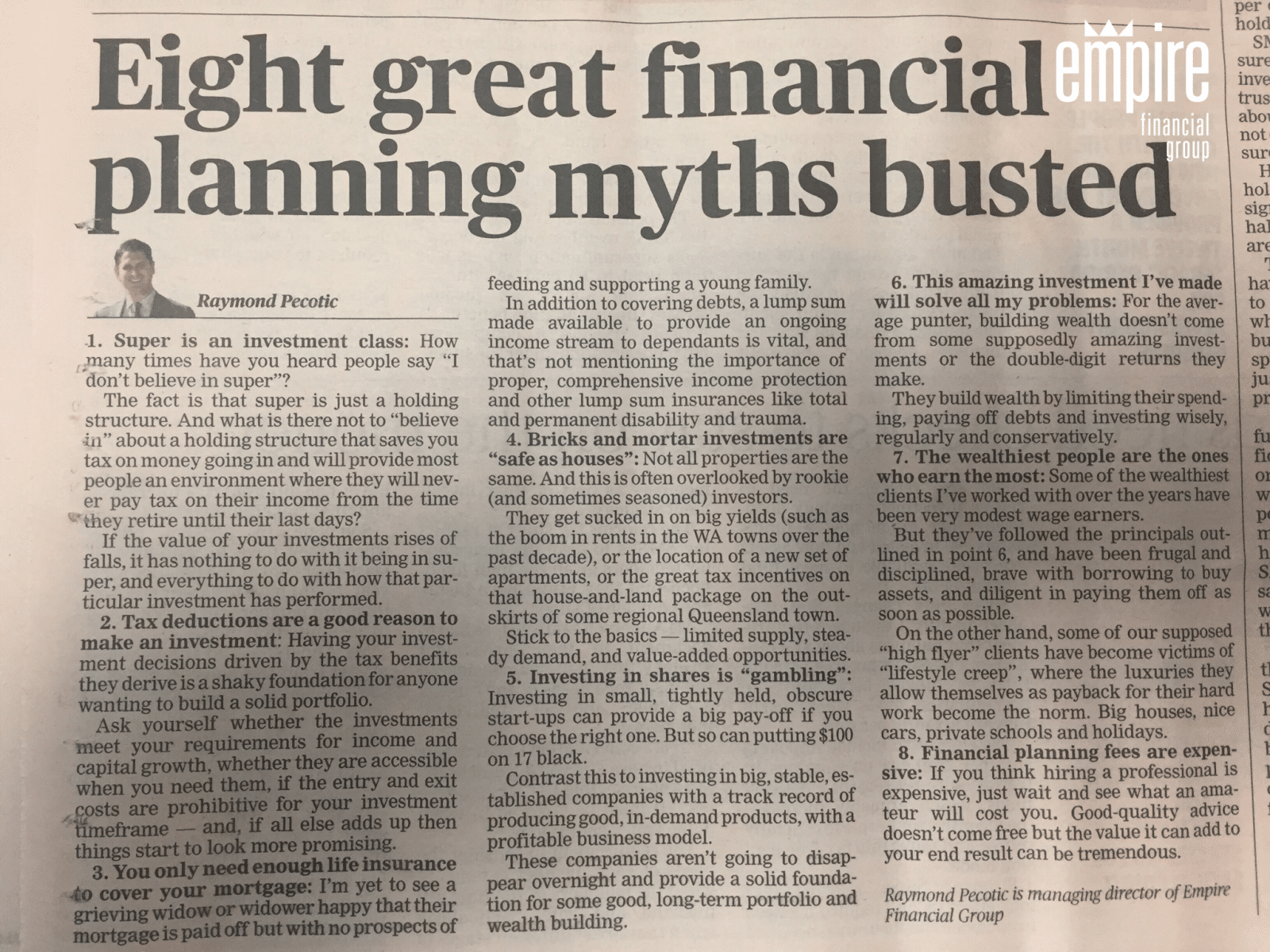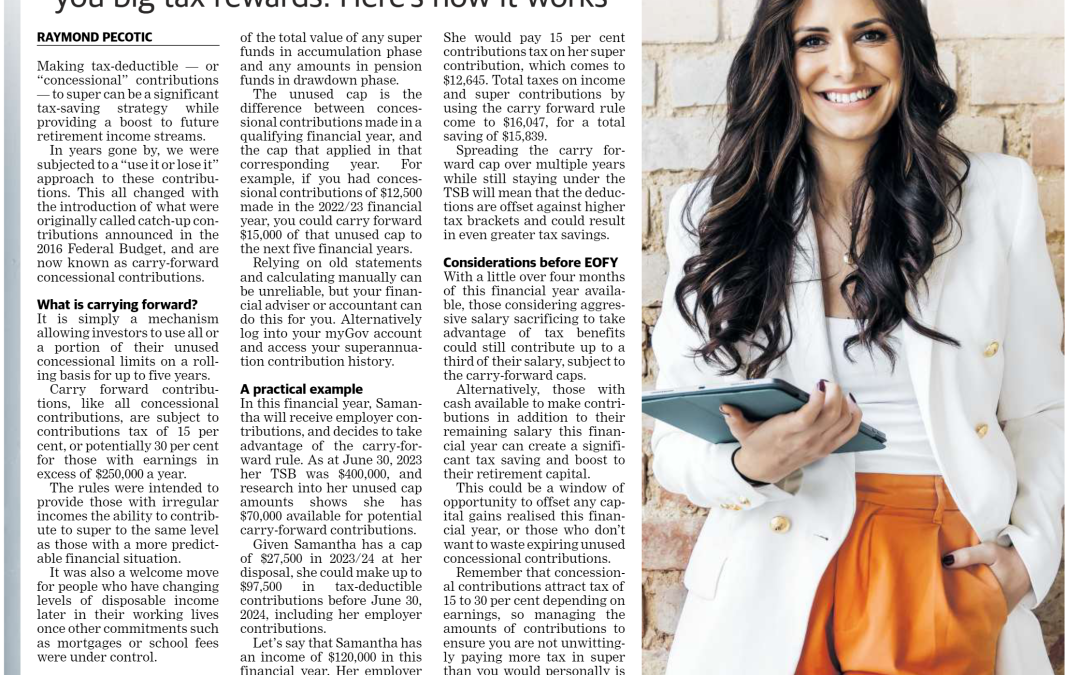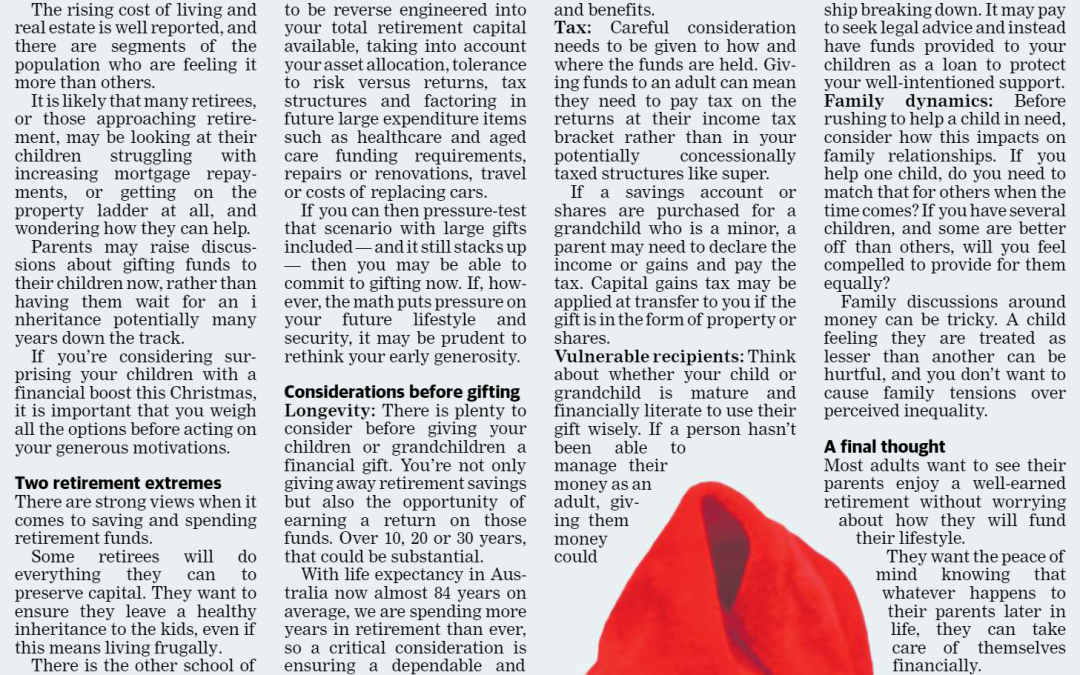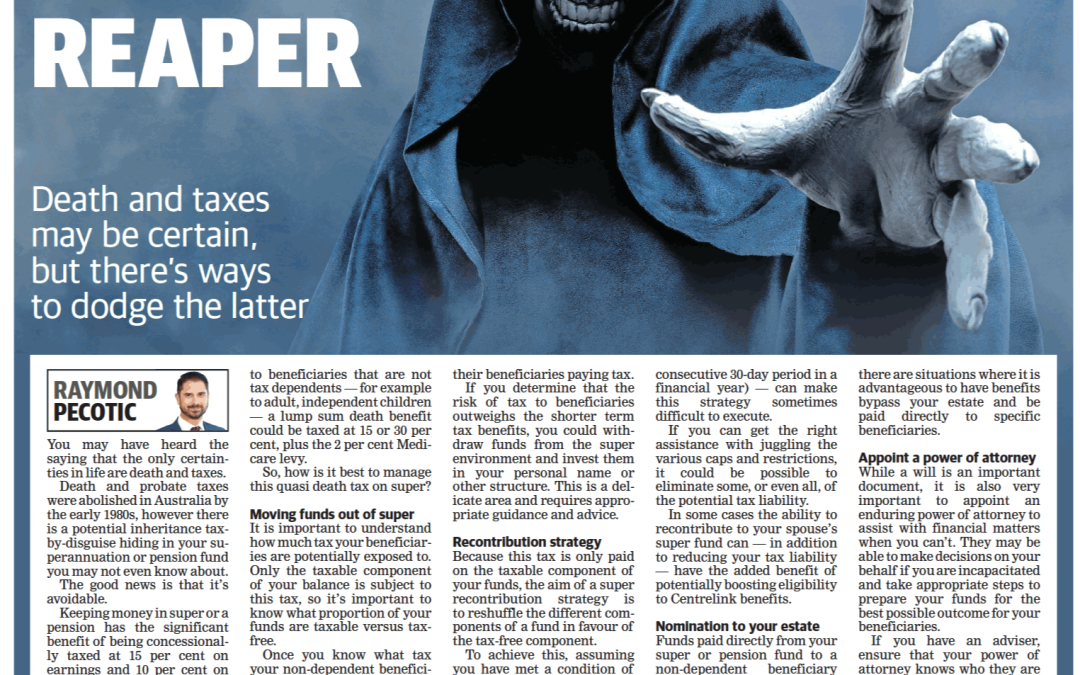(Note: this is the full, edited version of an article written by Raymond Pecotic, and published in “The West Australian”, 13 March 2017)
Bush advisers, smoke room gurus, your mates uncle who has done alright for himself – there is no shortage of people willing to lend their thoughts on all matters financial to anyone who’ll listen.
In a society that already has pretty low levels of financial literacy, the seeds sown by these well-intentioned amateurs leave many people confused or outright misinformed.
Part of our job as professional advisers is to educate and explain away some of these misconceptions, and these are a few of our favourites:
1. Super is an investment class
How many times have you heard people say “I don’t believe in super?”.
If I had a dollar for every time I’d heard that in my almost 20 years in this game, I’d have my feet up on a beach somewhere by now, not worrying about how I am going to afford private school fees for my 3 children.
The fact is that super is just a holding structure. And what is there not to “believe in” about a holding structure that saves you tax on money going in, and will provide most people an environment where they will never pay tax on their income from the time they retire until their last days?
If the value of your investments rises of falls, it has nothing to do with it being in super, and everything to do with how that particular investment has performed.
Super is not an investment – it’s a way of holding an investment. Therefore, super doesn’t perform well or bad. Choose your investments wisely with the right advice, but don’t bash the holding structure because of the markets.
2. Tax deductions are a good reason to make an investment
Having your investment decisions driven by the tax benefits they derive is a shaky foundation for anyone wanting to build a solid and sound investment portfolio.
Those of us who lived through the days of forestry investments, tax deferred property trusts and the like, and are smarter for it, are now cringing seeing the onslaught of property spruikers selling rental properties primarily on the basis of their depreciation and tax deductibility.
First and foremost, ask yourself whether the investments meet your short and long term requirements for income and capital growth, whether they are accessible when you need them, if the entry and exit costs are prohibitive for your investment time frame – and if all else adds up, and the tax deductions are an added bonus, then things start to look more promising.
Rushing into something for the tax deduction alone often ends in a holiday to Bali after you get your tax refund, and tears in years to come when you’re left holding the proverbial baby.
3. You only need enough life insurance to cover your mortgage
The day time tv infomercials are often the biggest culprits of spreading this myth, what with the picture-perfect family, with perfectly white teeth and matching knitted sweaters, shown making a call to the lovely call centre lady, asking about life insurance to cover the mortgage.
What garbage. Now granted, some insurance is better than none, but in all my years I’m yet to see a grieving widow or widower happy that their mortgage is paid off, but with no prospects of feeding and supporting a young family.
In addition to covering debts, a lump sum made available to provide an ongoing income stream to dependents is vital, and that’s not even mentioning the importance of proper, comprehensive income protection and other lump sum insurances like Total and Permanent Disability and Trauma.
And bear in mind, often these over the phone bought policies are underwritten at the time of claim, therefore not guaranteeing you have a valid policy at all.
A qualified adviser will ensure you have all the bases covered, for the right amounts, and that the policy has been comprehensively underwritten, providing you greater certainty of cover and of financial peace of mind.
4. Bricks and mortar investments are “safe as houses”
The Australian love affair with property runs deep. I must admit I too am infected with the bug. I just love buildings.
But not all properties are the same. And this fact is often overlooked by rookie (and sometimes seasoned) investors.
They get sucked in on big yields (such as the boom in rents in the Western Australian mining towns we experienced over the last decade), or the location of a new set of apartments, or the great tax incentives on that house and land package on the outskirts of some regional Queensland town.
Often, the corresponding oversupply (think big apartment building ghettos, and new estates with land as far as the eye can see), or sudden drop in demand (think Karratha and Port Hedland etc), leaves investors with a property they can’t rent or offload on their hands.
That’s great – if you’re looking to offset capital gains on other better performing investments. Not so great for your future financial comfort and stability.
Stick to the basics – limited supply, steady demand, and value add opportunities.
5. Investing in shares is “gambling”
“I’m not a shares person”. Second only to “I don’t believe in super” in the ranks of prejudiced, unreasonable and emotional proclamations.
I know where this comes from, because I’ve been there too. A hot tip. A friend, who has a friend, who has a friend who’s a geologist and knows something others don’t. Not only is this illegal (it’s called insider trading) but it’s often bulldust.
Investing in small, tightly held, obscure start ups can provide a big pay off if you choose the right one. But so can putting $100 on 17 Black.
This is not investing, it is speculating. Not quite gambling, because there is some thought or story to support the decision. But it is backing a potential winner and hoping for the best.
Contrast this to investing in big, stable, established companies with a track record of producing good, in demand products, with a profitable business model.
No, you won’t see a doubling of these stocks over the next month. And yes, sometimes they get it wrong and their profits, and share price suffer, like Woolworths for example.
But, on the whole these companies aren’t going to disappear overnight and provide a solid foundation for some good, long term portfolio and wealth building.
6. This amazing investment I’ve made will solve all my problems
There is no silver bullet, quick fix to building wealth (apart from perhaps a big business sale, the lottery or an inheritance).
For the average punter, building wealth doesn’t come from some supposedly amazing investments or the double digit returns they make. They build wealth by limiting their spending, paying off debts and investing wisely, regularly and conservatively.
This requires a plan and developing new habits and disciplines to stick to it.
Sorry folks, like the path to a slim and trim body – some inherit it genetically from their parents, but the rest of us need to work out and sweat to get the results.
7. The wealthiest people are the ones who earn the most
Some of the wealthiest clients I’ve worked with over the years have been very modest wage earners. But they’ve followed the principals outlined in point 6, and have been frugal and disciplined, brave with borrowing to buy assets, and diligent in paying them off as soon as possible.
On the other hand, some of our supposed “high flyer” clients have become victims of “lifestyle creep”, where the luxuries they allow themselves as pay back for the hard work they’re doing become the new norm. Big houses, nice cars, private schools and expensive holidays.
The lifestyle is there, but the savings are not. These people can often be incredibly vulnerable and exposed, while their more modest income earning counterparts sleep easily at night.
I’m no advocate for living like a pauper if you don’t have to – in fact, one of the biggest issues with those who understand the concept of delayed gratification is that they delay it so long it’s usually their children who benefit from the hard work and not them.
Finding a balance between the two is important.
8. Financial planning fees are expensive
If you think hiring a professional is expensive, just wait and see what an amateur will cost you. This is one of my favourite sayings, and it’s pretty self explanatory.
Good quality advice doesn’t come free, but the value it can add to your end result can be tremendous.
Often we’ll see people look to save a few bucks by working with less skilled, cheaper service providers, or worse still, those that offer a “free” service.
And in my experience the supposedly free advice is the one that ends up costing the most.



